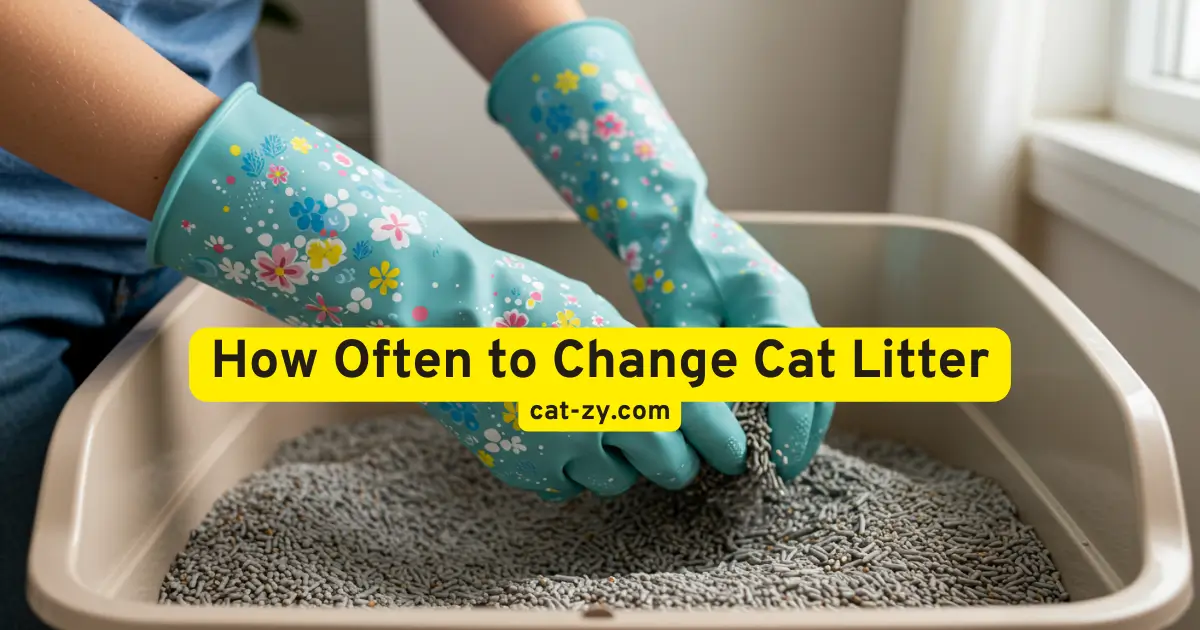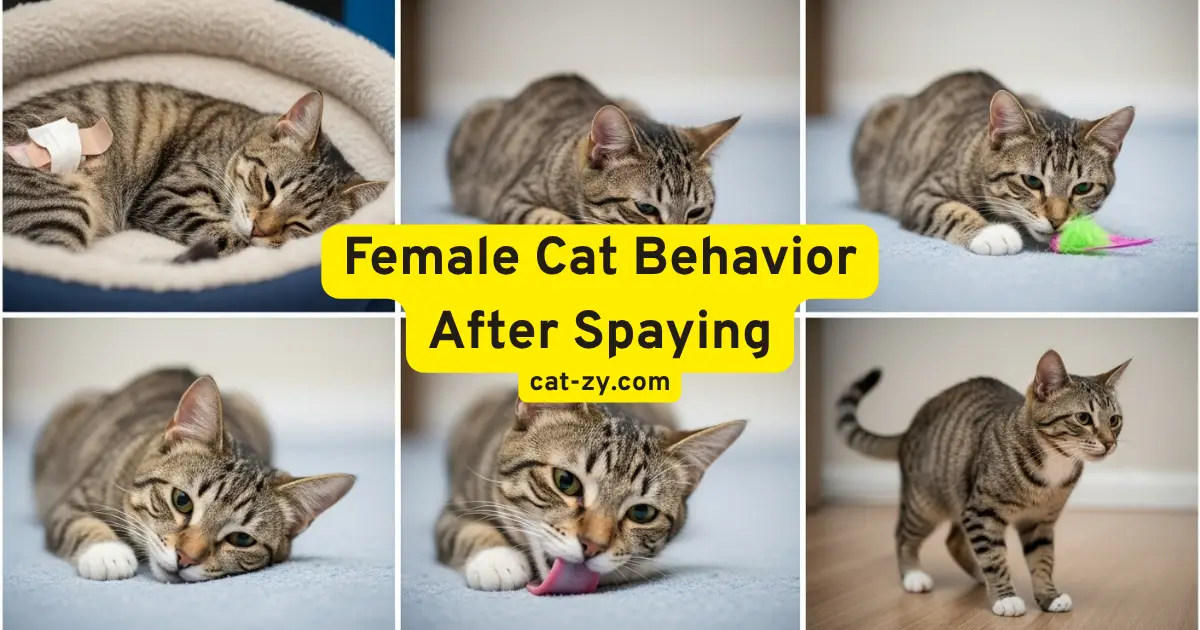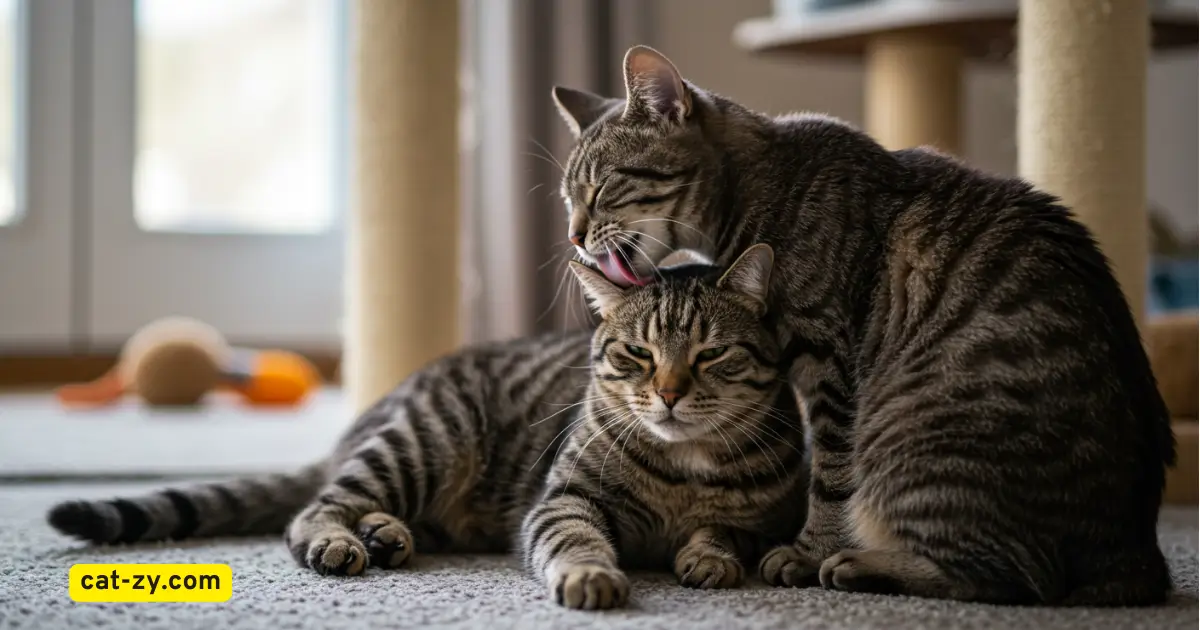Do Female Cats Spray? 5 Startling Reasons Explained
As a cat owner, you might have wondered if your female cat can spray. It’s a common worry that can be confusing and scary. If you’re dealing with this or just curious, you’re in good company.
Cat spraying is a puzzling behavior that often leaves owners asking, ‘Do female cats spray?’ and searching for answers. Knowing why cats spray is key to solving the problem.
In this article, we’ll look at five main reasons why cats spray. This will help you figure out why it’s happening and how to stop it. By understanding the reasons, you can make your home a happier place for both you and your cat.
Table of Contents
Understanding Cat Spraying Behavior
Many cat owners wonder ‘Do female cats spray’ because cat spraying behavior is often not well understood. But knowing its basics is key to solving the problem. Spraying is a natural act for cats, but it can be a challenge in a home setting.
What Is Cat Spraying?
Cat spraying means a cat lets out a small amount of urine on surfaces like walls or furniture. It’s different from regular urination. Spraying is mainly for communication and marking territory.
The Difference Between Spraying and Urination
Both spraying and urination involve urine, but they serve different purposes. Urination is for waste, while spraying is for sending messages to other cats.
Signs Your Cat Is Spraying
If your cat is spraying, it will stand with its tail shaking and release urine on a surface. You’ll also notice a strong, smelly odor, typical of cat spray.
Do Female Cats Spray? The Surprising Truth
Female cats’ spraying is more common than you might think. It’s important to understand why. While it’s often linked to male cats, females can spray too, under certain conditions.
Prevalence of Spraying in Female Cats
If you’re wondering, ‘Do female cats spray?’ studies show that female cats, mainly those not spayed, can spray urine. It’s less common than in males, but a big problem for many cat owners. Spaying can lower the chance of spraying, but it’s not a complete fix.
Comparing Male and Female Spraying Behaviors
Male and female cats spray for similar reasons, like marking territory and communicating. But female cats spray more often due to stress or health issues. Knowing these differences helps tackle the problem better.
Common Misconceptions About Female Cat Spraying
When people ask, ‘Do female cats spray?’ many assume only male cats spray. Others believe spaying or neutering stops spraying for good. These steps can help, but they don’t always work. Other factors like environment, health, and stress matter too when dealing with spraying cats.
Understanding why female cats spray helps prevent or reduce it. You can change their environment, check their health, or train them. There are many ways to handle the issue.
Reason #1: Territorial Marking and Defense
One main reason your cat sprays is to mark its territory. This is an instinct for many cats. They have scent glands on their faces, near their whiskers, and on their paws. They also have them in their urine.
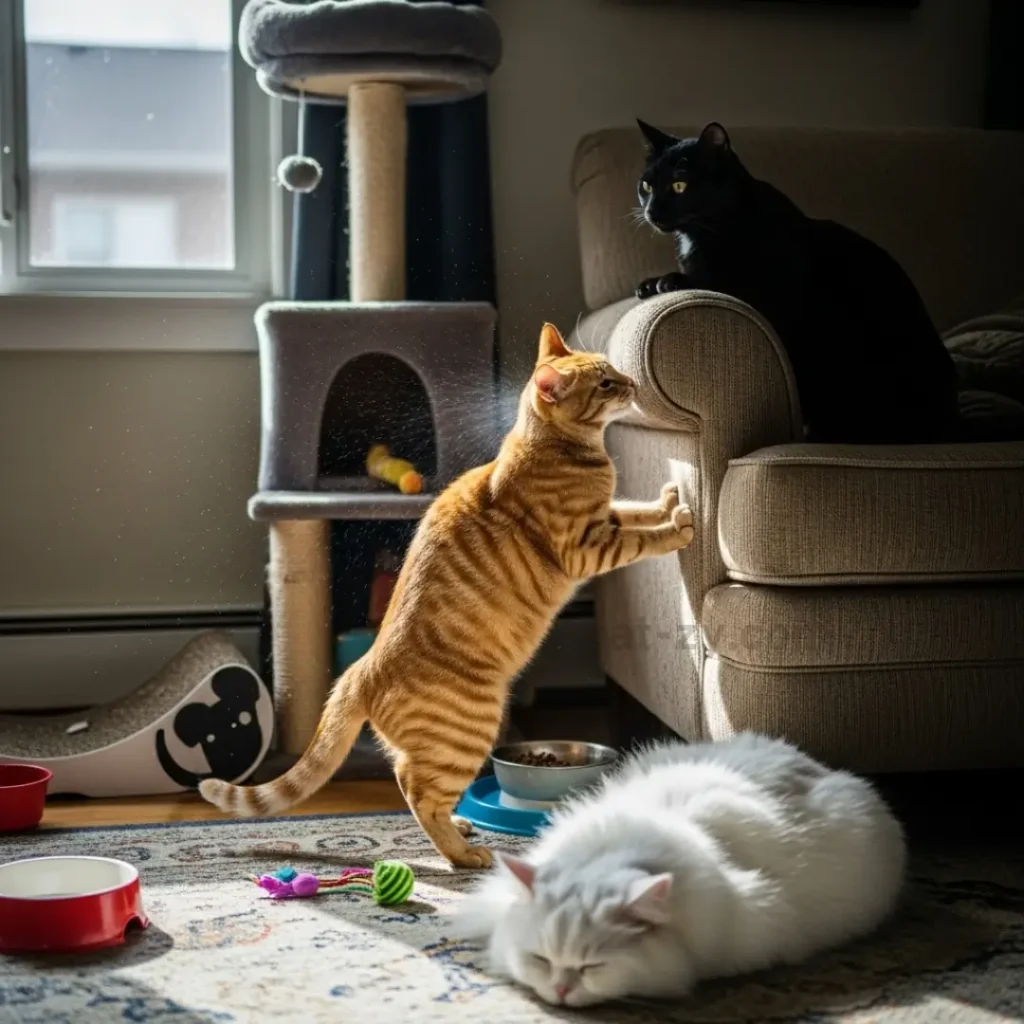
When they spray, they leave their scent on surfaces. This tells other cats to stay away. It’s a way for them to claim ownership.
How Cats Define Their Territory
Cats define their territory in several ways. They use scent marking, visual cues, and patrolling. They rub their faces and bodies on surfaces to leave their scent.
Spraying is also important for them. It lets them communicate with other cats over long distances.
Multi-Cat Household Dynamics

In homes with multiple cats, territorial disputes can happen. Spraying can be a way for cats to show dominance or signal their presence. To reduce spraying, provide multiple litter boxes and secure areas for cats.
By doing this, you can help prevent cat spraying. It helps reduce competition and stress.
Outdoor Cats and Territory Disputes
Outdoor cats can also cause territorial disputes. If your cat sees or smells another cat, it may spray to defend its territory. To stop this, block your cat’s view of the outdoors or use deterrents.
Understanding these dynamics can help you prevent cats from spraying in the future.
By recognizing the role of territorial marking, you can address the causes of spraying. You might need to change your cat’s environment or manage cat interactions. Using products to reduce stress and anxiety can also help.
Reason #2: Reproductive Status and Hormonal Influences

Spraying in female cats is often linked to their reproductive status and hormonal changes. This behavior is driven by their instinct to mate or mark territory.
Unspayed Females in Heat
If you’re asking, ‘Do female cats spray?’ Unspayed female cats in heat are more likely to spray. This is due to a surge in sex hormones. It’s a natural way for them to signal they’re ready to mate.
Do Spayed Cats Spray?
Spraying is less common in spayed female cats. This is because spaying reduces sex hormones. Yet, some spayed cats may spray due to stress or medical issues.
Timing of Spaying and Its Effects
The timing of spaying affects spraying behavior. Cats spayed before their first heat cycle are less likely to spray. Knowing how spaying impacts your cat’s behavior helps in making health decisions.
Key Considerations: If your cat isn’t spayed, spaying can reduce spraying. If your spayed cat is spraying, see your vet to check for medical issues.
Understanding how reproductive status and hormones affect spraying helps address this behavior. Whether through spaying or other methods, you can reduce or stop spraying in your female cat.
Reason #3: Stress and Anxiety Triggers
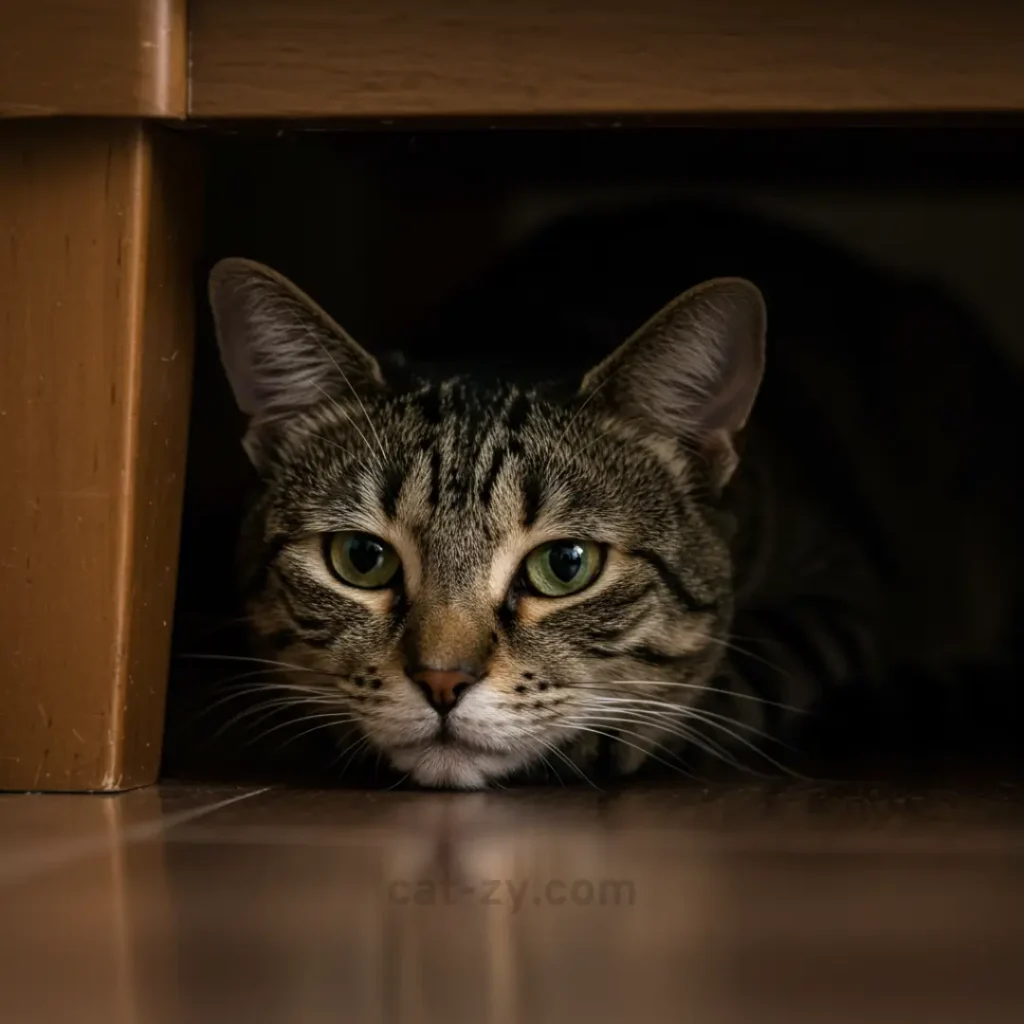
Stress and anxiety play big roles in cat spraying. Knowing what causes these feelings is key for cat owners. Cats get stressed easily, which can make them spray.
Environmental Changes
Changes in your cat’s world can stress them out, leading to spraying. This might happen when you move furniture, add new decor, or change your work hours. Keeping things the same and sticking to a routine can help.
New Pets or Family Members
Bringing new pets or family members can stress your cat, causing them to spray. It’s important to introduce them slowly and calmly. Giving your cat their own space can also help reduce stress.
Moving to a New Home
When you move, it’s a big change for your cat, too. They might spray because of the new place. Bringing familiar items like their bed or toys can make them feel more at home. Creating a cozy spot for them in the new place can also help.
Creating Safe Spaces During Transitions
When you’re moving or getting new pets, a safe space for your cat is a big help. This could be a quiet room where they can go when feeling stressed. Make sure it has things they love, like their bed and toys. This can help lower their stress and maybe stop them from spraying.
To help your cat feel less stressed, try pheromone products or calming aids. These mimic natural calming signals for cats. They can be really useful during big changes or when new things come into your cat’s world. Understanding and dealing with your cat’s stress and anxiety can help stop them from spraying.
Reason #4: Medical Issues That Cause Spraying
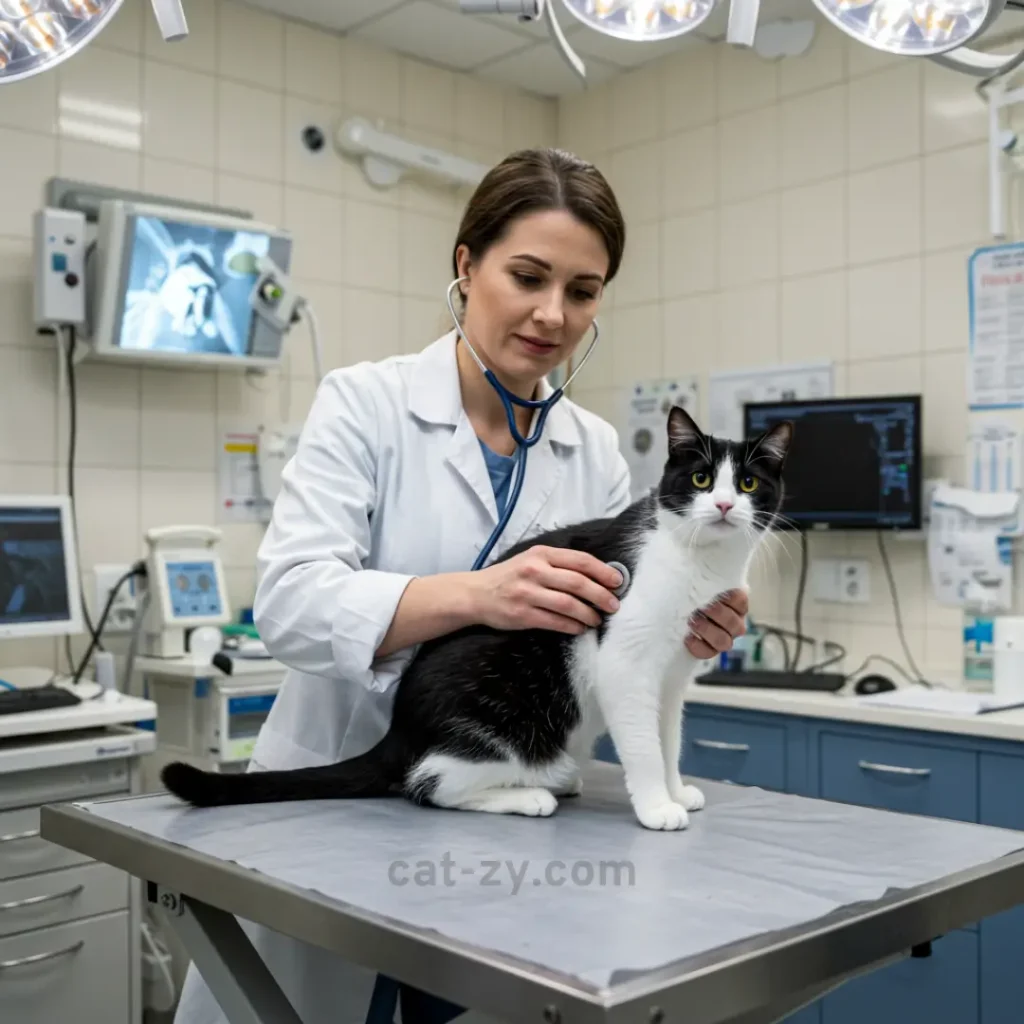
When your cat starts spraying, it’s important to think about health problems. Cats spray due to health issues that cause them pain or discomfort.
Urinary Tract Infections
Urinary tract infections (UTIs) are a common cause of spraying. UTIs make cats associate the litter box with pain. Symptoms include frequent urination, accidents outside the litter box, and visible pain while urinating. If you think your cat has a UTI, see your vet for a diagnosis and treatment.
Other Health Conditions
Other health issues can also lead to spraying. These include kidney stones, diabetes, and hyperthyroidism. These conditions can make urination more frequent or cause discomfort, leading to spraying. Regular vet visits can catch these problems early.
When to Consult Your Veterinarian
If your cat starts spraying, it’s wise to see your vet. Your vet will do a physical exam and might suggest tests to find the cause of spraying.
Diagnostic Tests for Spraying Cats
Tests might include urinalysis for infections, blood tests for health, and imaging like X-rays or ultrasound for the urinary tract. These tests help your vet understand why your cat is spraying and create a treatment plan.
Reason #5: Communication and Social Signaling
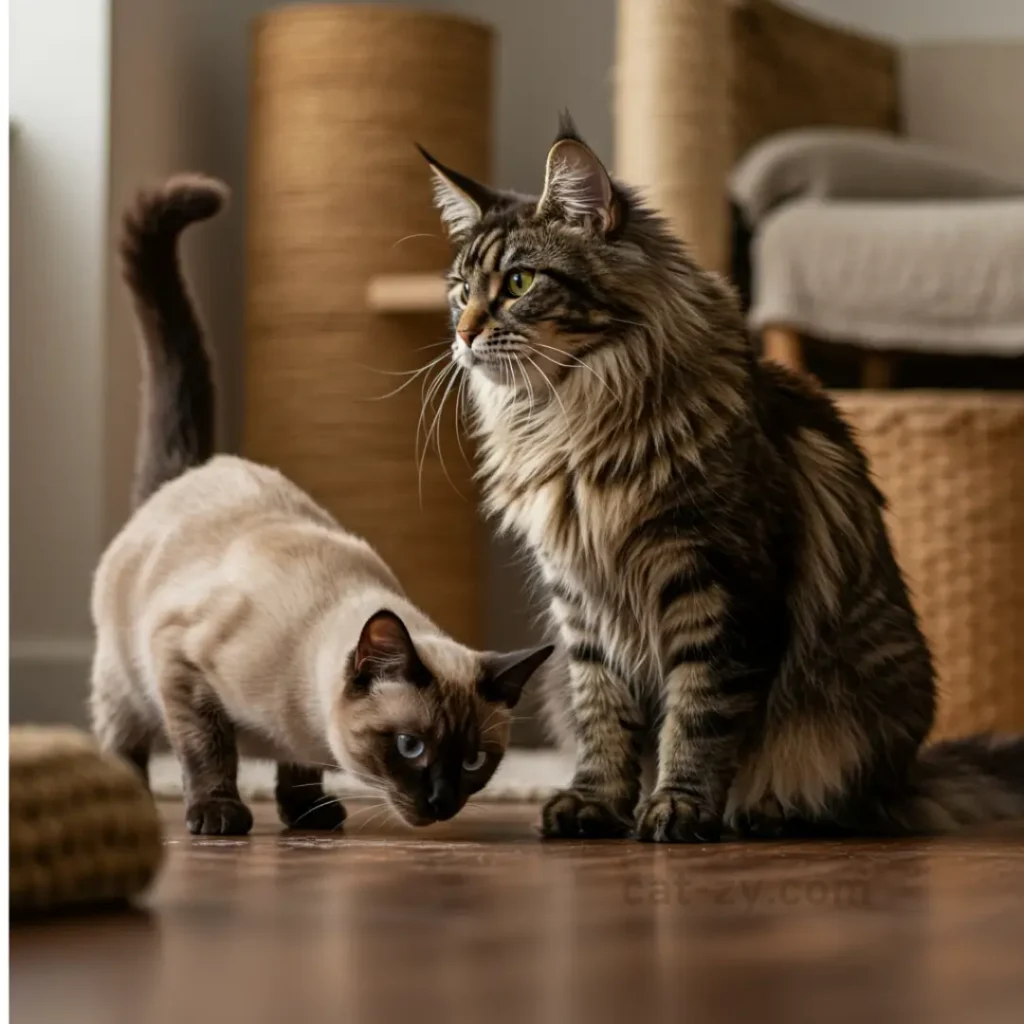
Spraying is more than just marking territory. It’s a way cats talk to each other. They use urine spraying to send messages, which is key to their social life.
Chemical Messages in Cat Urine
Cat urine has special chemical signals, or pheromones. These signals tell other cats about the cat’s reproductive status, dominance, or mood. When your cat sprays, they send these pheromones out.
These chemical messages can mean a cat is ready to mate, marking their territory, or showing their feelings. Knowing this can help you deal with spraying better.
Communicating with Other Cats
Cats spray to talk to other cats at home or outside. It helps them show who’s boss or that they’re around.
In homes with more than one cat, cats spray to assert their dominance or show their place in the pecking order. Knowing why your cat sprays can help you stop it.
Interpreting Your Cat’s Spraying Messages
When you ask Do female cats spray for specific reasons, understanding what your cat is saying helps stop the behavior. Are they stressed, marking territory, or something else?
Watching where and when your cat sprays can tell you a lot. This info is key to stopping or reducing spraying. You might need to change their environment or use pheromone products to calm them.
Seeing spraying as a way cats communicate can improve your bond with them. It helps you understand their needs and actions better.
How to Effectively Clean and Remove Cat Spray Odors
Getting rid of cat spray odors is key to a clean, comfy home. When cats spray, they leave a strong smell that’s hard to get rid of if not done right.
Enzymatic Cleaners and Why They Work
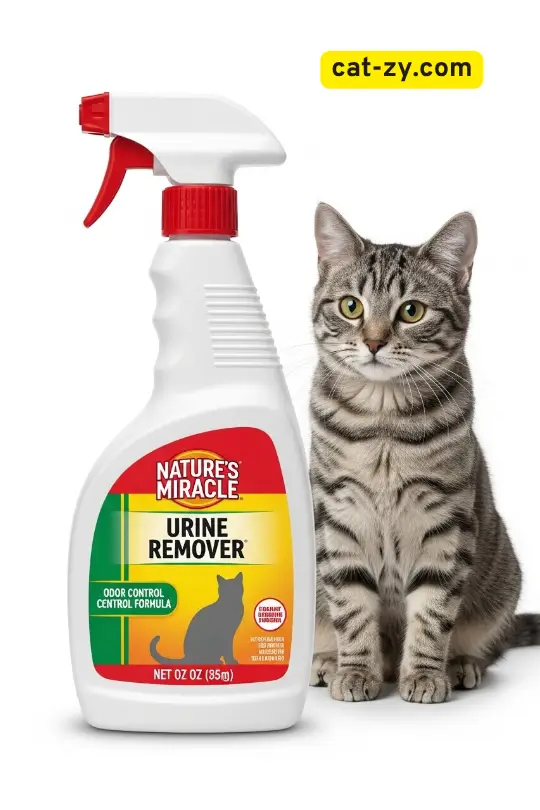
Whether you’re dealing with males or wondering do female cats spray, enzymatic cleaners are made to break down cat urine proteins, removing the smell. They have enzymes that digest uric acid crystals. This makes them great at getting rid of cat spray smells.
Step-by-Step Cleaning Process
To clean cat spray well, first blot the area with paper towels to soak up as much urine as you can. Next, use an enzymatic cleaner as directed. Let it sit for the time suggested, then rinse and dry the area well.
Preventing Re-marking of Cleaned Areas
To stop your cat from spraying in the same spot again, make sure it’s clean and smells like nothing. Also, try to reduce stress and anxiety in your cat’s life. These can make them spray more.
Products to Avoid When Cleaning Cat Spray
Don’t use ammonia-based cleaners because they can draw your cat back to the same spot. They smell like cat urine. Choose enzymatic cleaners or products made to remove pet smells instead.
Comprehensive Solutions to Prevent and Stop Cat Spraying
Cat spraying can be tough to handle, but there are ways to stop it. Understanding why cats spray and making changes can help. You can also use training and other methods to help your cat.
Environmental Modifications
Changing your cat’s environment can help a lot. Provide more litter boxes and reduce stress between cats. Also, give your cat places to hide when feeling stressed.
Behavioral Training Techniques
Training your cat is key to stopping spraying. Use positive reinforcement to reward good behavior. Also, find and fix what’s causing your cat stress or anxiety.
Pheromone Products and Calming Aids
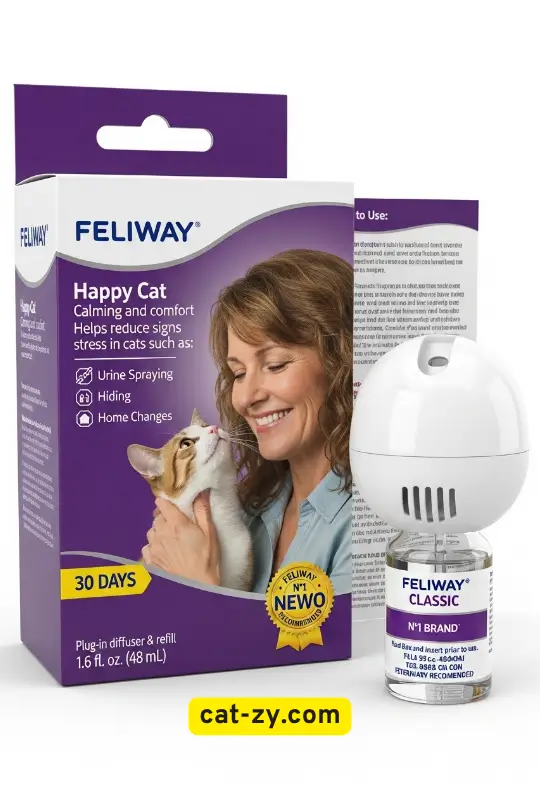
Pheromone products, like Feliway, can calm your cat. They mimic the pheromones mother cats use to soothe their kittens. Other calming aids, like treats or diffusers, can also help.
Professional Help Options
Sometimes, you need professional help for cat spraying. An animal behaviorist can give you insights and a plan to stop the behavior.
Working with Animal Behaviorists
An animal behaviorist can find the cause of your cat’s spraying. They’ll help you create a plan and guide you on training and environmental changes.
When Medication Might Be Necessary
In some cases, medication is needed for cat spraying. This is true if it’s due to medical issues or severe anxiety. Talk to your vet about what’s best for your cat.
Conclusion: Creating a Supportive Environment for Your Cat
Understanding why your female cat sprays is key to solving the problem. Factors like territorial marking, reproductive status, stress, medical issues, and communication are all important. By knowing these triggers, you can start to fix the issue.
To create a supportive environment, reduce stress and anxiety for your cat. Make sure their health needs are met. Also, use the right cleaning products to get rid of spray odors.
If your cat sprays due to health problems, see a vet. For stress-related spraying, try changing the environment and using pheromone products. By understanding why cats spray, you can make your home a happier place for both you and your pet.
FAQ
Do female cats spray?
Yes, female cats can spray, though it’s less common than in males. Spraying is a way for cats to mark their territory. Both males and females can do this.
What is cat spraying?
Cat spraying is when cats release a small amount of urine on vertical surfaces. Unlike normal urination that removes bodily waste, spraying serves a completely different function.
Do spayed cats spray?
Yes, spayed cats can spray, though spaying might reduce it in some. The success of spaying in stopping spraying varies by cat and timing.
How can I stop my cat from spraying?
To stop your cat from spraying, try environmental changes and behavioral training. Use pheromone products too. Also, address stress, medical issues, or territorial marking.
How do I clean and remove cat spray odors?
Apply enzymatic cleaning solutions that decompose the protein compounds found in cat urine. Follow a cleaning process and prevent re-marking.
Can stress cause my cat to spray?
Yes, stress and anxiety can make cats spray. Changes, new pets, or moving can stress them out.
Are there medical issues that can cause my cat to spray?
Yes, medical issues like urinary tract infections can cause spraying. If you think it’s a health problem, see your vet.
Do cats stop spraying after being neutered?
Neutering can help reduce or stop spraying in some cats. But it’s not a sure thing. It depends on the cat and when they were neutered.
How can I prevent my cat from spraying?
Prevent spraying by spaying or neutering, reducing stress, and addressing health issues. Use pheromone products. Create a supportive environment and pay attention to your cat’s needs.
Why do female cats spray indoors?
Female cats spray indoors primarily due to territorial instincts, stress, or medical conditions. Environmental changes, the presence of other cats, or hormonal influences can trigger this behavior. Unspayed females may spray more frequently, especially during heat cycles. Creating a calm environment and addressing underlying health issues can help reduce indoor spraying significantly.
At what age do female cats start spraying?
Female cats typically begin spraying around sexual maturity, which occurs between 5-6 months of age. However, spraying behavior can develop at any age depending on environmental factors, stress levels, and health conditions. Spaying before the first heat cycle significantly reduces the likelihood of developing spraying habits throughout their lifetime.
Can multiple litter boxes prevent cat spraying?
Yes, providing multiple litter boxes can help prevent spraying, especially in multi-cat households. The general rule is one litter box per cat plus one extra. Proper placement in quiet, accessible locations and regular cleaning are essential. However, litter boxes alone won’t solve spraying caused by stress, medical issues, or hormonal factors.
How long does a cat’s spray smell last?
Cat spray odor can persist for months or even years if not properly cleaned. The uric acid crystals in cat urine bond strongly to surfaces and reactivate with moisture. Using enzymatic cleaners specifically designed for pet urine is crucial for complete odor removal. Thorough cleaning prevents cats from returning to spray the same spot again.
Is cat spraying the same in indoor and outdoor cats?
Indoor and outdoor cats spray for similar reasons—territory marking, communication, and stress—but outdoor cats typically spray more frequently due to encounters with other cats. Indoor cats may spray in response to seeing outdoor cats through windows. The behavior serves the same purpose regardless of living environment, though triggers may differ significantly.



